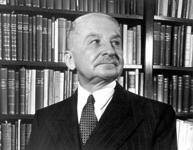| English: GFDL picture of F.A. Hayek to replace fair use images that are used in some articles. Released by the Mises Institute. (Photo credit: Wikipedia) |
| English: Ludwig von Mises in his library (Photo credit: Wikipedia) |
Individuals are the units of mutation in societal evolution, and without them there are no institutions and there is no evolutionary process.I mean by this statement that every change in an institution—every step in societal evolution—requires the choice of an individual. These choices require rationality, in Mises's minimal sense of the term, and may produce many consequences—intended or unintended—that then may lead to modification or even rejection of the choice.
To take Menger's narrative of the evolution of money, some individual(s) must have chosen the commodity that then became the most liquid. At first it would only have been the idea that a specific exchange could be accomplished with this commodity. But then, others may have observed the success and chimed in—an unintended consequence or, to quote Adam Ferguson, "the result of human action, but not the execution of any human design."
Suggesting that individuals are the units of mutation is intended to tie a direct link between societal evolution and biological evolution. The argument that biological evolution is "random," while societal evolution is not, is to misunderstand both. Both biological and societal evolution stand upon previous developments that were required to support the next tentative step. Just as the biological space must be littered with so many failures, so must the societal space be littered with discarded, unworkable ideas. It must also be understood that biological dead ends and bad ideas may exist indefinitely, as long as they are able to survive in some ecological niche.
In this vast background of ideas, the mutations created by individuals may exhibit similarities, but rarely congruence. In the realm of economics the marginal revolution was credited to three economists—Walras, Jevons, and Menger—but the three expressed these ideas differently, with Menger using a non-mathematical approach that is still considered superior by members of the Austrian school.
In my own case I would argue that I have combined the ideas of Mises, Hayek, and Popper, while adding a little sauce of my own,* to produce something that is superior to what any of them advocated. There is no doubt that some people are on the same track, playing in the same sandbox as I am—Matt Ridley, to whom I suggested a reason for the resistance of politics to evolution, is definitely one. My hope is that someone with more credibility and ability to communicate either stumbles on my efforts or comes up with something similar on his own, as our species seems, after a brief respite, to be heading for another Great War.
*This fails to acknowledge those in my intellectual history, including Robert LeFevre, Andrew J.Galambos, Richard Sprague, and Rafe Champion, among others, who have influenced and guided me in my "unended quest" to figure out what the hell is going on.
Edit:
In an article by Richard Ebeling I came across a supportive quote from Mises (Theory and History, p 196):
But the historical process is not designed by individuals. It is the composite outcome of the intentional actions of all individuals. No man can plan history. All he can plan and try to put into effect is his own actions that, jointly with the actions of other men, constitute the historical process. The Pilgrim Fathers did not plan to found the United States.

